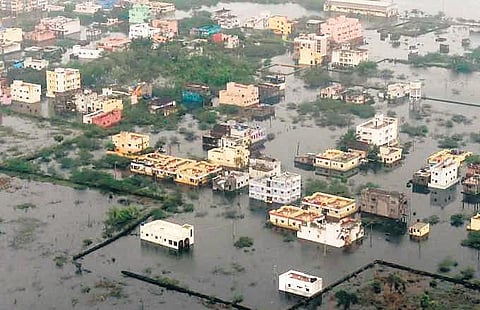

CHENNAI: A climate modelling study carried out by researchers at the Indian Institute of Technology - Madras (IIT-M) has shown that rise in carbon emission may lead to extreme rainfall in Chennai. It also said the area affected is likely to expand.
The study, which used Weather Research and Forecasting model for predictions, was aimed at finding the effect of climate change on the 2015 floods in Chennai.
Projection of these results to the future showed that factors such as surface temperature and moisture content in the region are likely to increase leading to a rise in atmospheric instability and extreme rainfall.
The projections were made for the year 2075.
The precipitation on December 1, 2005 — the peak rainy day in the data used in the study — can increase by 17.37 per cent in the future compared to the current levels, the modelling showed.
Further, the geographical extent of the region receiving more than 200 mm of rainfall for three days was seen to increase in the future.
“The size and intensity of heavy rainfall events can increase significantly in the far-future high-emission scenario climate conditions. If a similar event occurs in the future, flood is likely to continue for more days. This calls for better preparations to face the disaster,” the study said.
The total increase in precipitation for five days, from November 30, 2015 to December 4, 2015 was 33.32 per cent.
Following the peak rainy days, the model showed that rainfall from December 2-4 can increase by 183.5 per cent, 233.9 per cent and 70.8 per cent respectively.
Chennai is one of the cities where per capita greenhouse gas emission falls in the higher category. The findings of the research were published in Current Science on June 25.
The research was carried out as part of the project ‘Climate change impacts on coastal infrastructure and the adaptation strategies’ funded by the Department of Science and Technology, under the SPLICE-climate change programme. C Balaji, P Jyoteeshkumar and PV Kiran are the researchers involved in the study.